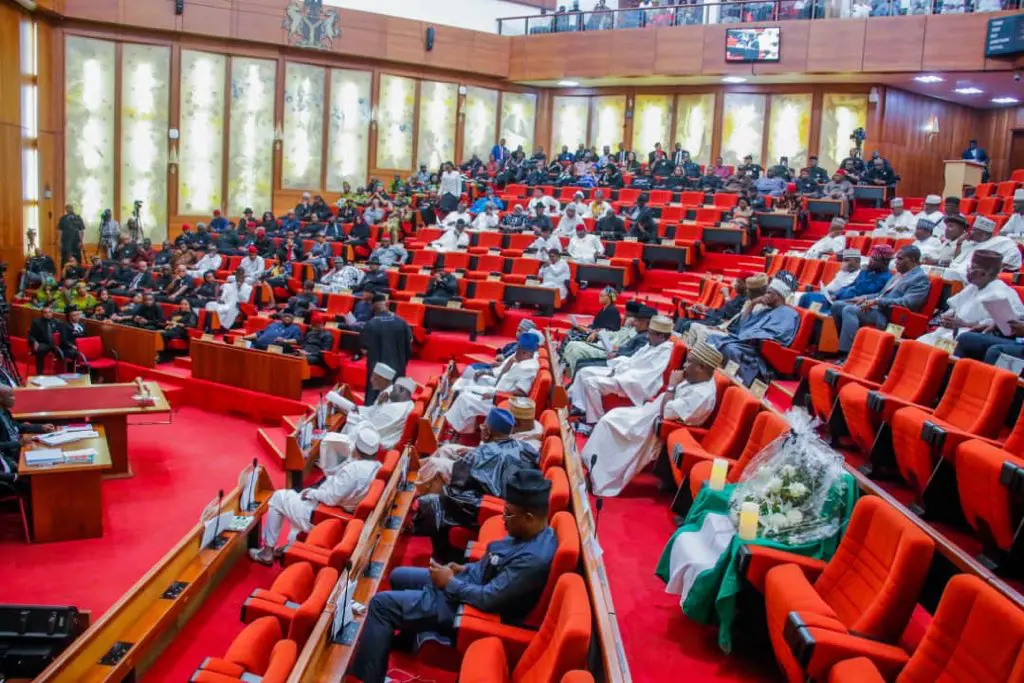The Nigerian Senate has suspended action on the President Bola Tinubu’s tax reform bills following public backlash on the proposed legislations.
Deputy Senate President Jibrin Barau, presiding over Wednesday’s plenary session, stated that the committee would work with the Attorney-General and Minister of Justice to address the concerns raised by the stakeholders.
The Senate announced the formation of a 10-member committee to meet with the Attorney General of the Federation and Minister of Justice, Lateef Fagbemi, to address contentious issues in the tax reform bills submitted by President Bola Tinubu.
The committee, chaired by Senate Minority Leader Abba Moro, will also include other notable senators such as Orji Kalu, Adamu Aliero, and Sani Musa. Their primary goal is to examine the contentious clauses in the bills, particularly issues such as the derivative clause and VAT sharing formula, which have sparked widespread criticism.
The Red Chamber further instructed the Committee on Finance to stay in action on the public hearing pending the time the agitation in the public space is addressed.
This comes as the Senate constituted a special committee to meet with the executive branch and work with the federal government to resolve the issues surrounding the tax reform bills.
“In this regard, we have decided to set aside politics, ethnicity, and regionalism to work together on resolving the issues surrounding the tax reform bills.
“In collaboration with the executive arm of government, we agreed to establish a forum to identify and address contentious areas to ensure national unity and progress.
“Before the introduction of these bills, we faced numerous challenges, including insecurity and economic issues.
“The President has been working to address these problems, and we are committed to supporting these efforts while tackling global economic challenges.
“We also agreed that no other issues should aggravate the country’s current difficulties.
“It has been mutually decided between the Executive and the Senate to engage the Judiciary to sort out these matters,” Barau stated.
Recall that the bills sparked controversy upon their introduction to the National Assembly.
Already, the House of Representatives has suspended indefinitely the debate on the tax reforms bills earlier fixed for Tuesday.
The bills, which include the Joint Revenue Board of Nigeria (Establishment) Bill, 2024; Nigeria Revenue Service (Establishment) Bill, 2024; Nigeria Revenue Service (Establishment) Bill, 2024; and Nigeria Tax Bill, 2024, are aimed at revamping the country’s tax laws.
However, Northern governors and the National Economic Council rejected the bills on the grounds that they would put the region at a disadvantage.
But Taiwo Oyedele, Chairman of the Presidential Fiscal Policy and Tax Reforms Committee, recently explained that the bills are more favourable to the Northern region.
Meanwhile, the latest move by the Senate comes after the bills were passed for second reading at the Senate last week.
On Tuesday, the House of Representatives had a rowdy session over divergent views on the tax reform bills.
10 Facts about the proposed tax reform bills in this article.
1. Key Bills Introduced
The reform package includes four main bills: the Nigeria Tax Bill, the Nigeria Tax Administration Bill, the Nigeria Revenue Service (Establishment) Bill, and the Joint Revenue Board (Establishment) Bill. Each bill addresses specific aspects of tax administration, compliance, and enforcement.
2. Major Benefits
The proposed bills aim to ensure uniformity in tax revenue administration across Nigeria, eliminate double taxation, use taxation to encourage private sector investment in critical industries and boost disposable incomes through targeted tax exemptions.
3. Reduction of Tax Burden
A notable feature of the reforms is the proposal to reduce the corporate income tax rate from 30% to 25% over the next two years. This reduction seeks to alleviate financial pressures on businesses and foster investment.
4. Derivation Principles in VAT Revenue Distribution
The bills propose a significant shift in VAT revenue distribution, allocating revenues based on the states where goods and services are consumed rather than pooling them centrally for redistribution. The Federal Inland Revenue Service (FIRS) Chairman, Zacch Adedeji, explained that this approach aligns VAT with its nature as a consumption tax.
5. Exemptions for Low-Income Earners
The reforms propose exempting individuals earning below the minimum wage from the Pay As You Earn (PAYE) tax. Similarly, small businesses with annual turnovers of N50 million or less would be exempt from paying taxes.
6. Harmonisation of Tax Administration
The Nigeria Tax Administration Bill aims to standardise tax rules across federal, state, and local levels. This measure seeks to reduce taxpayer confusion and compliance costs, thereby enhancing transparency and efficiency in tax collection.
7. Creation of the Nigeria Revenue Service
The Nigeria Revenue Service (Establishment) Bill proposes transforming the Federal Inland Revenue Service (FIRS) into a centralised agency responsible for tax collection nationwide. This rebranding aims to improve accountability and streamline revenue generation processes.
8. Joint Revenue Board for Taxpayer Rights
The establishment of a Joint Revenue Board is proposed to replace the existing Joint Tax Board. This new body would focus on protecting taxpayer rights and resolving disputes, with representatives from all tax authorities promoting a unified approach to tax administration.
9. Supporting Private Sector Investment
The reforms position taxation as a strategic tool to attract private sector investment into critical industries, contributing to Nigeria’s broader economic development goals.
10. Second Reading Approved in the Senate
The proposed bills advanced to their Second Reading in the Senate despite some lawmakers’ reservations regarding stakeholder consultations and the derivation principle. The Senate Committee on Finance has been mandated to review the bills and report back within six weeks.

